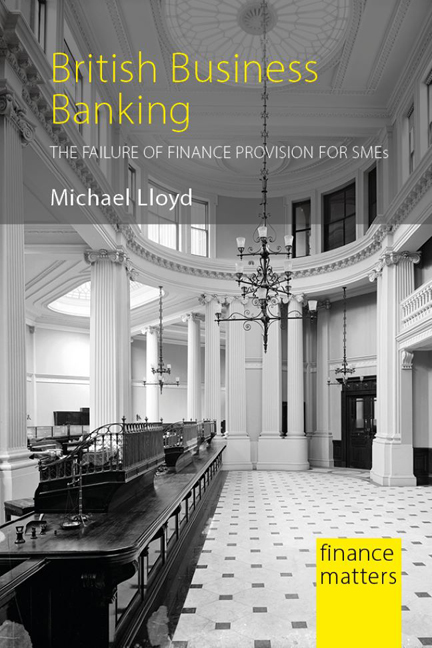Book contents
- Frontmatter
- Contents
- Acknowledgements
- Introduction
- 1 British banks and the industrial revolution
- 2 Modern British banking since 1900
- 3 From the other side: the culture of British SMEs
- 4 Banking problems for SMEs and alternative financial provision
- 5 UK financial and political economic culture
- 6 Optimum financial institutional structures and SME performance
- 7 Implementing reform
- Notes
- References
- Index
Introduction
Published online by Cambridge University Press: 20 December 2023
- Frontmatter
- Contents
- Acknowledgements
- Introduction
- 1 British banks and the industrial revolution
- 2 Modern British banking since 1900
- 3 From the other side: the culture of British SMEs
- 4 Banking problems for SMEs and alternative financial provision
- 5 UK financial and political economic culture
- 6 Optimum financial institutional structures and SME performance
- 7 Implementing reform
- Notes
- References
- Index
Summary
Within the European Union the dominance of bank lending in the financing of small and medium sized enterprises (SMEs) is well-observed. Indeed, so much so that one main aim of the 2014 launch of the Capital Markets Union (CMU) programme was to change what was viewed as an over-reliance by European Union companies on bank lending for investment (Pesendorfer 2015). In the EU, 86 per cent of new funding in 2017 came from banks, principally investment loans, and only 14 per cent from capital markets. The intention of the CMU was to encourage SME access across a more integrated capital market across the EU.
But this preponderance of bank investment loans to SMEs across the EU conceals the startling fact that in one country, the United Kingdom, exactly the opposite is the case. In the UK, most SME funding is not via standard bank investment loans, but instead short-term bank overdrafts and credit cards (83 per cent; Ernst & Young 2018). This puzzling outlier position of the UK, in relation to the relative absence of long-term investment finance provision to SMEs, requires an explanation. Currently, in the UK, SMEs are defined as having a turnover of less than £25 million and less than 250 employees and represent 99 per cent of all private businesses. A considerable variety of sectors are represented within this overall SME universe. Note that the EU SME definition has a higher turnover level, up to €50 million/£45 million and this is the definition employed in this book. This book, therefore, addresses an important, and persistent, problem in British political economy: namely, why British banking has not adequately invested in British SMEs, and especially manufacturing.
The position in the UK has its roots in the culture and historical and institutional structure of the British banking system, alongside explanatory factors among the UK SME population. However, banking systems and industrial companies do not exist in a vacuum. The political economic environment of the country and its culture play an important role in influencing institutional, cultural, and business behaviour, both historically and today. It is the case that, during principally the eighteenth and nineteenth centuries, business banking structures evolved differently in the UK than in other European countries (and in the US).
- Type
- Chapter
- Information
- British Business BankingThe Failure of Finance Provision for SMEs, pp. 1 - 6Publisher: Agenda PublishingPrint publication year: 2021

